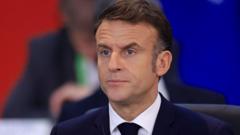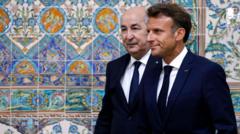The match between France and Israel saw a notable political presence due to recent violent incidents involving Israeli fans in Amsterdam. The heavy security arrangements reflected the heightened tensions as authorities strived to prevent a repeat of the chaos.
Tensions Mount as France Hosts Heavily Secured Soccer Match Against Israel

Tensions Mount as France Hosts Heavily Secured Soccer Match Against Israel
In the wake of violence in Amsterdam, France's national soccer match against Israel turns into a politically charged event under tight security.
In a stark reminder of how politics can overshadow sports, the highly publicized match between the French and Israeli national soccer teams on Thursday was marked by heightened security measures following violent incidents directed at Israeli fans mere weeks prior in Amsterdam. French President Emmanuel Macron, flanked by Prime Minister Michel Barnier and other senior political figures, attended the game, a decision signaling the importance of ensuring safety during a turbulent time.
The recent events in Amsterdam, characterized by antisemitic violence and disorder during a match involving a Dutch team and an Israeli squad, cast a significant shadow over the game at Stade de France. As the French national team faced an underwhelming opponent without its star striker, Kylian Mbappé, the focus shifted from the match itself to the political and social implications surrounding it.
In anticipation of potential unrest, French authorities implemented an extensive security operation, likened to preparations for a major global summit. With 4,000 police officers deployed, alongside 1,600 private security personnel, the presence was immense and unyielding. Spectators and media alike underwent rigorous security checks as they entered the stadium.
The police aimed to reassure attendees and prevent a recurrence of the troubling scenes witnessed in the Netherlands. In doing so, they not only sought to protect the immediate participants of the match but also to convey a broader message of resilience and vigilance against the rising tide of violence permeating the world of sports.
As fans settled into the stands to watch a seemingly routine match, the political undertones rippled through the ranks of attendees, serving as a reminder of how interconnected sport and society could become. This clash of athleticism and geopolitical significance is a vivid illustration of how circumstances can transform a simple game into a complex arena of public scrutiny and concern.




















